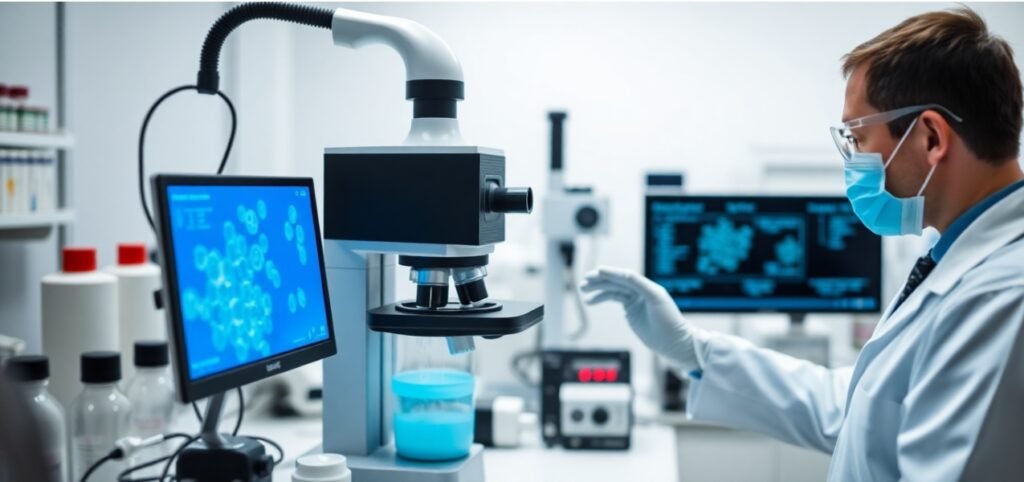Artificial Intelligence (AI) is transforming the healthcare industry. From diagnosing diseases to personalizing treatments, AI is making medical care faster, more accurate, and accessible. If you’re new to the topic, this guide will help you understand the role of Artificial Intelligence in Healthcare.

1. What is Artificial Intelligence in Healthcare?
Artificial Intelligence in Healthcare refers to the use of smart computer systems that can learn, analyze data, and assist doctors in making better medical decisions. AI can process vast amounts of medical information quickly, reducing human errors and improving patient outcomes.
For example, AI can analyze X-rays and MRIs to detect diseases like cancer at an early stage. It can also predict which treatment will work best for a particular patient based on their medical history.
2. How AI is Changing Medical Diagnoses
Faster and More Accurate Diagnoses
Doctors rely on medical tests to diagnose diseases. However, analyzing these tests manually takes time and can lead to mistakes. AI speeds up this process by scanning medical images, lab results, and patient records within seconds.
Detecting Diseases Early
AI systems can detect diseases like cancer, diabetes, and heart conditions earlier than traditional methods. Early detection increases the chances of successful treatment and saves lives.
Reducing Human Errors
Doctors are highly skilled, but they can make mistakes, especially when dealing with large amounts of patient data. AI acts as an extra pair of eyes, helping doctors spot issues they might miss.
3. AI in Personalized Treatment Plans
Tailored Treatments for Every Patient
Not all treatments work the same way for everyone. AI analyzes patient data to create personalized treatment plans. It considers factors like genetics, lifestyle, and medical history.
Predicting Treatment Outcomes
AI can predict how a patient will respond to a particular treatment. This helps doctors choose the most effective therapies, reducing trial and error in medical care.
4. AI-Powered Virtual Assistants and Chatbots
Answering Patient Questions
Many people have health-related questions but may not have immediate access to a doctor. AI chatbots provide instant answers, helping patients understand their symptoms and when to seek medical help.
Appointment Scheduling and Reminders
AI virtual assistants can schedule doctor appointments, remind patients to take their medication, and even monitor chronic conditions like diabetes and hypertension.
5. AI in Drug Discovery and Research
Finding New Medicines Faster
Developing new drugs is a time-consuming and expensive process. AI speeds up research by analyzing chemical structures and predicting how new drugs will interact with the human body.
Identifying Potential Side Effects
AI helps researchers identify possible side effects of new drugs before human trials, making the development process safer and more efficient.
6. The Future of AI in Healthcare
Expanding Access to Medical Care
In remote areas where doctors are scarce, AI-powered tools can provide basic medical advice, diagnose illnesses, and even assist with remote surgeries through robotic systems.
Making Healthcare More Affordable
By reducing the cost of research, diagnosis, and treatment, AI is making healthcare more affordable and accessible to more people worldwide.
Ethical Concerns and Challenges
Despite its benefits, AI also raises concerns. Privacy issues, data security, and the potential replacement of human doctors are topics that need careful consideration. However, AI is meant to assist, not replace, healthcare professionals.
Conclusion
Artificial Intelligence in Healthcare is revolutionizing the way doctors diagnose, treat, and care for patients. From early disease detection to personalized treatments, AI is improving healthcare outcomes and making medical care more efficient. As technology continues to evolve, AI will play an even bigger role in shaping the future of healthcare.
If you’re interested in how AI is transforming medicine, keep an eye on new developments. The future of healthcare is smart, efficient, and AI-driven! (Artificial Intelligence in Healthcare)

Your article helped me a lot, is there any more related content? Thanks!
Pingback: The Future of Computer Programming - Tech Passion
Pingback: What Is AI Technology and How Does It Work? - Tech Passion